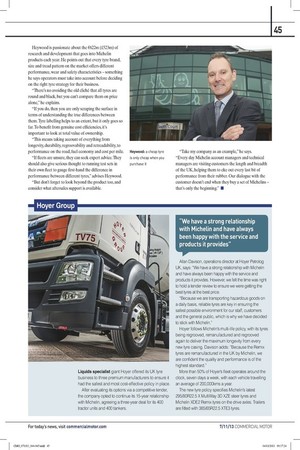• When less is more
Page 36

Page 37

If you've noticed an error in this article please click here to report it so we can fix it.
Some operators believe that buying a cheap tyre saves money but what if that tyre fails every month? Trucking Britain sponsor Michelin has the answer By Barry Dew
AS COMMERCIAL DIRECTOR of Michelin's truck tyre division in the UK, Guy Heywood has a somewhat unorthodox strategy. He isn't aiming to sell more tyres. In fact, his primary objective is to help his customers use as few tyres as possible, just so long as they say Michelin on the sidewall.
Heywood kicks off our meeting quoting a remark made by a customer. He tells us that John Sheffield, boss of timber haulier Sheffield & Co, moved to a Michelin policy after realising that: "A cheap tyre is only cheap when you purchase it. If you have a problem, then it quickly becomes an expensive tyre."
"His words sum up the importance of tyre choice in a nutshell," he continues. "When customers think about their tyre policy, they should really be focused on buying value.
"A Michelin truck tyre is not a commodity, it's an investment. Our customers can get full use of every gram of rubber in a Michelin — and by working in conjunction with our Michelin Truck Professional and ATS Euromaster service partners, it's our job to make sure they do this. We are not driven by volumes. If tyres last longer — and ours do — then fewer are sold and the cost per mile is lower."
Heywood is passionate about the €622m (£523m) of research and development that goes into Michelin products each year. He points out that every tyre brand, size and tread pattern on the market offers different performance, wear and safety characteristics — something he says operators must take into account before deciding on the right tyre strategy for their business.
"There's no avoiding the old cliché that all tyres are round and black, but you can't compare them on price alone," he explains.
"If you do, then you are only scraping the surface in terms of understanding the true differences between them. Tyre labelling helps to an extent, but it only goes so far. To benefit from genuine cost efficiencies, it's important to look at total value of ownership.
"This means taking account of everything from longevity, durability, regroovability and retreadability, to performance on the road, fuel economy and cost per mile.
"If fleets are unsure, they can seek expert advice. They should also give serious thought to running test sets in their own fleet to gauge first-hand the difference in performance between different tyres," advises Heywood.
"But don't forget to look beyond the product too, and consider what aftersales support is available.
"Take my company as an example," he says. "Every day Michelin account managers and technical managers are visiting customers the length and breadth of the UK, helping them to eke out every last bit of performance from their rubber. Our dialogue with the customer doesn't end when they buy a set of Michelins — that's only the beginning •








































